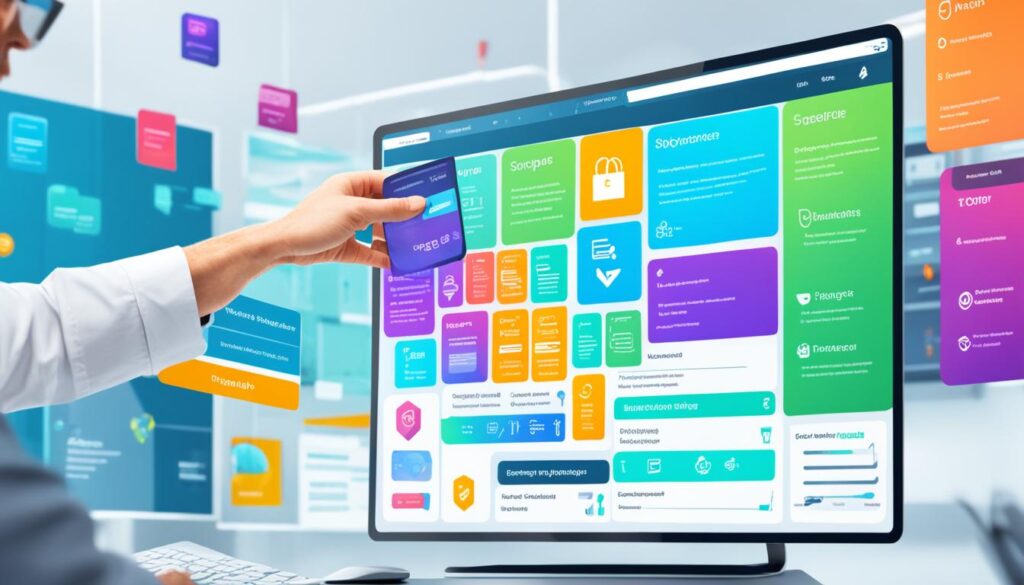In 2024, the software acquisition landscape is growing and changing fast. The world’s demand for new software is driving this change. The market for Investor ESG Software, for example, has grown from $624.3 million in 2022 to an estimated $1450.47 million by 2028. This growth is thanks to companies like Enablon, WeSustain, and CFA Institute.
Getting the right software has become critical. This is because of the impact of COVID-19 and conflicts in different regions. Strategies for getting software have to be smarter now.
Key Takeaways
- The software acquisition market is set to grow significantly, with a 15.09% CAGR expected from 2022 to 2028.
- Leading companies like Enablon, WeSustain, and CFA Institute play pivotal roles in this growth.
- Global disruptions like COVID-19 and regional conflicts necessitate efficient acquisition methods and strategies.
- AI and automation are crucial in revolutionizing talent acquisition and streamlining processes.
- Cloud-based innovations, on-premise solutions, and hybrid models are key trends shaping software sourcing strategies in 2024.
The Latest Trends in Software Acquisition for 2024
By 2024, software buying is a mix of cloud tools, on-site solutions, and mixes of both. Companies are looking for new ways to buy software. This helps them keep up in a changing market.
Cloud-Based Innovations
Cloud tools are changing how software is bought. For example, eProductivity Software has a cloud tool called Nubium. It helps small to medium printers by making things easier and improving their work. The FaaS market helps cut costs, increase security, and grow easily. Quantum uses flash and object storage to make things smoother. They fit well with cloud plans.
On-Premise Solutions
On-site software is becoming more popular again. Dell and others are investing a lot to manage data on-site. Old systems, costing trillions, are still important. Most of the money for IT goes to maintaining these old systems, known as “technical debt.” Upgrading these systems will hit $54.8 billion by 2028.
Hybrid Models
Hybrid models mix cloud and on-site benefits. This gives companies the best of both worlds. They get cloud’s expandability and on-site’s security. FinOps and GreenOps use these mixes for better money tracking and to be greener. Distributed computing is also getting popular for its big and safe solutions. This makes hybrids good choices for many companies.
In 2024, buying software will be more exciting and diverse. Mixing cloud, on-site, and hybrid systems lets companies build what they need. They can better meet their goals and keep up with the market.
Top Software Acquisition Methods in 2024
In 2024, how businesses buy software is changing. They are focusing on being flexible and putting customers first. These new ways help them stay competitive and keep their operations smooth.
Subscription-Based Licensing
The subscription-based licensing approach is very popular in 2024. It’s loved for its ability to fit any company’s size and its fixed price. This makes managing money easier. Plus, companies get updates and support often. For many, this way of buying software is key in staying up to date.
Pay-Per-Use Models
Pay-per-use models are also on the rise. With this method, companies pay only for what they actually use. This is great for those whose needs change a lot or are trying new tech. It shows how the software world is moving towards being more flexible and focused on clients.

In 2024, companies are using these methods to be quicker in adapting to the market. They combine subscription-based licensing with pay-per-use models for a smart, flexible way to get software. This promises a dynamic and quick way to meet their software needs.
Innovative Software Acquisition Strategies
In 2024, businesses are facing big changes in how they get software. They are using smart plans to keep up. Companies see the value of new ways to get software, like working with others, buying smaller companies, or using software just for their type of industry.
Mergers and Acquisitions
Buying or merging with other companies is still a top choice to get new tech and grow. Big deals, like Broadcom buying VMware, take a lot of time to get approved by regulators. Yet, companies choose this path to get new tools, grow faster, and get more skilled people.
Getting smaller companies can give them new and cool products very quickly. This is especially true for companies focused on AI. Using AI in the buying process helps them make better choices and join companies together quicker. This is key to beating others in their market.
Collaborative Partnerships
Working together with other companies is growing in popularity. This way, companies can create new things faster and share the risks. It helps them save money and find new ways to earn, which is important since software is getting cheaper and competition is tough.
Partnering with others is great for lowering the cost of finding new customers and dealing with tough regulations. It also helps them offer a wider range of products, which makes their business stronger. This has led to more teamwork between different industries, making them better with digital and tech advancements, like the smart use of AI.
Industry-Specific Software Solutions
More companies are looking for software that is just right for their field. They want software that works perfectly for what they do. For example, there are now a lot of chatbot software options thanks to AI and simpler ways to make apps.
In 2024, we will see even more software made just for certain industries. This shows how important it is to have software that really helps a business run better and reach its goals. Companies are spending more on making new software and finding new business chances. This keeps them growing and up to date in the software world.
| Strategy | Benefits | Challenges |
|---|---|---|
| Mergers and Acquisitions | Access to new technologies, market expansion, talent acquisition | Regulatory scrutiny, longer deal timelines |
| Collaborative Partnerships | Innovation acceleration, shared risks, cost optimization | Integration complexities, cultural alignment |
| Industry-Specific Solutions | Tailored functionalities, operational efficiency | High development costs, niche market limitations |
Overall, companies are putting a lot of focus on getting software in new and smart ways. This is to handle tough competition and keep growing in the changing landscape of the software industry in 2024.
Advancements in Software Procurement in 2024
The world of advancements in software procurement 2024 is changing fast. The market for Procurement Software was worth USD 7797.15 million in 2022. It’s expected to hit USD 13732.07 million by 2028, growing at 9.89% every year. This surge comes as people want more efficient and custom software, thanks to new tech.
GEP Corporation, Jaggaer Inc., and Coupa Software Inc. are top forces in this change. They use smart tools to give detailed looks at the market, looking at things like money and size.

Industries like manufacturing, transportation, and healthcare will see big benefits. Both on-site and online software options are popular, fitting many needs. Using AI and automation makes it easier to see and improve buying processes, making business decisions better and faster.
The software market aims to make things easy and adaptable for all. There will be big growth and new ideas from 2022 to 2030. This is a big chance for new players to jump in and succeed.
Market experts use special tools to check the market and find new chances. Things like Porter’s five forces and SWOT help them understand money and strategy. As we deal with these big changes, businesses are looking at a bright future of doing better, quicker, and at lower costs.
| Market Insights | Details |
|---|---|
| Market Value (2022) | USD 7797.15 million |
| CAGR | 9.89% |
| Expected Market Value (2028) | USD 13732.07 million |
| Key Players | GEP Corporation, Jaggaer Inc., Coupa Software Inc. |
| Application Segments | Manufacturing, Transportation and Logistics, Healthcare |
| Software Types | On-premise, Cloud Solutions |
Cutting-Edge Software Acquisition Trends
In 2024, big changes are coming in how we buy software. AI and blockchain are leading the way. SaaS is becoming more popular, with only 25% of new software buys going to late adopters.
AI-Powered Decision Making
AI is becoming key in choosing software. It helps predict what we need and make smart choices. Nearly all companies plan to use AI to make their systems run better. This change is making traditional ways of buying software less common. Top software acquisition methods in 2024 are sure to include AI.
Blockchain for Audit Trails
Using blockchain for checks is getting big in the software world. It makes purchase steps clear and hard to change. This means safer deals and more trust in software buying. Blockchain keeps the buying process reliable and free from fraud.
Next year, a company might spend over $5 billion on software. This shows how AI and blockchain help sellers in the software market. These new ways of buying software make it not just better but safer and more trustworthy.
Conclusion
In 2024, software acquisition trends show a mix of new ideas and saving money. Businesses are using AI, cloud systems, and blockchain more than before. These things help companies work better and lower their costs.
AI does more than people in some tasks, boosting the work of programmers, consultants, and others. It makes businesses more productive. Generative AI got a lot of money in 2022 and 2023, hitting $25.2 billion. But, humans are still needed for hard problem-solving and planning.
Even with these big investments, smart system training costs a lot—like $191 million for Google’s Gemini Ultra. However, more and more big companies are talking about the benefits of this kind of AI. Regulation wise, the U.S. made more AI rules, going from one in 2016 to 25 in 2023. This means the market is growing up and businesses need to change with it.
But, people are worried about losing jobs to AI. 36% of adults are concerned. This shows we need to use AI carefully and fairly. Staying flexible and smart is crucial in 2024’s software world. Businesses have to be ready to handle new tech well and keep their data safe.




